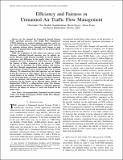Efficiency and Fairness in Unmanned Air Traffic Flow Management
Author(s)
Chin, Christopher; Gopalakrishnan, Karthik; Egorov, Maxim; Evans, Antony; Balakrishnan, Hamsa
DownloadAccepted version (5.630Mb)
Open Access Policy
Open Access Policy
Creative Commons Attribution-Noncommercial-Share Alike
Terms of use
Metadata
Show full item recordAbstract
IEEE As the demand for Unmanned Aircraft Systems (UAS) operations increases, UAS Traffic Flow Management (UTFM) initiatives are needed to mitigate congestion, and to ensure safety and efficiency. Congestion mitigation can be achieved by assigning airborne delays (through speed changes or path stretches) or ground delays (holds relative to the desired takeoff times) to aircraft. While the assignment of such delays may increase system efficiency, individual aircraft operators may be unfairly impacted. Dynamic traffic demand, variability in aircraft operator preferences, and differences in the market share of operators complicate the issue of fairness in UTFM. Our work considers the fairness of delay assignment in the context of UTFM. To this end, we formulate the UTFM problem with fairness and show through computational experiments that significant improvements in fairness can be attained at little cost to system efficiency. We demonstrate that when operators are not aligned in how they perceive or value fairness, there is a decrease in the overall fairness of the solution. We find that fairness decreases as the air-ground delay cost ratio increases and that it improves when the operator with dominant market share has a weak preference for the fairness of its allocated delays. Finally, we implemented UTFM in a rolling-horizon setting with dynamic traffic demand, and find that efficiency is adversely impacted. However, the impact on fairness is varied and depends on the metric used.
Date issued
2021Department
Massachusetts Institute of Technology. Department of Aeronautics and AstronauticsJournal
IEEE Transactions on Intelligent Transportation Systems
Publisher
Institute of Electrical and Electronics Engineers (IEEE)
Citation
Chin, Christopher, Gopalakrishnan, Karthik, Egorov, Maxim, Evans, Antony and Balakrishnan, Hamsa. 2021. "Efficiency and Fairness in Unmanned Air Traffic Flow Management." IEEE Transactions on Intelligent Transportation Systems, 22 (9).
Version: Author's final manuscript